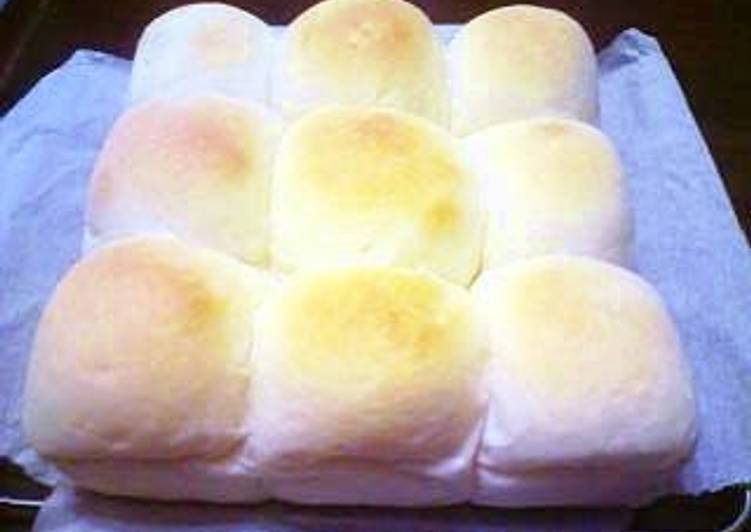Fluffy Milk Bread. You may know it as "Japanese milk bread" or "Hokkaido milk bread," named for the region's famous milk. It's the peak of indulgence, golden brown on the outside and soft and fluffy inside with a hint of sweetness courtesy of the most important ingredient: sweetened condensed milk. It's almost time for tasty bread, but there are a few steps left.
 BTW, this bread is what Panko bread crumbs are made of.
This is one of the softest and fluffiest bread by Savor Easy on YouTube.
It's a condensed milk bread, that has all of the warm and buttery taste.
You can have Fluffy Milk Bread using 7 ingredients and 12 steps. Here is how you cook it.
BTW, this bread is what Panko bread crumbs are made of.
This is one of the softest and fluffiest bread by Savor Easy on YouTube.
It's a condensed milk bread, that has all of the warm and buttery taste.
You can have Fluffy Milk Bread using 7 ingredients and 12 steps. Here is how you cook it.
Ingredients of Fluffy Milk Bread
- Prepare 200 grams of Bread (strong) flour.
- You need 50 grams of Cake flour.
- It's 30 grams of Sweetened condensed milk.
- It's 180 ml of Warm milk (about 40°C).
- It's 4 grams of Salt.
- Prepare 3 grams of Dry yeast.
- It's 15 grams of Unsalted butter.
I love condensed milk, and sometimes it might be sweet for others. I would eat this type of bread in the morning with my black coffee, which would balance out the sweetness of my dark coffee. Another defining characteristic of milk bread is the way in which you can gently pull apart each slice into soft, feathery layers—like a fluffy, bready version of a croissant. Milk bread (also known as Hokkaido milk bread) is a lightly-sweetened Japanese white bread that's incredibly soft and fluffy.
Fluffy Milk Bread instructions
- Mix the milk and sweetened condensed milk, and heat until about 40°C..
- Combine half of the bread flour (100 g) and cake flour in a bowl, put the dry yeast in the middle, pour in the mixture from Step 1, and mix well until there are no lumps..
- Add the remaining bread flour (100 g), salt, and butter brought to room temperature to the bowl, and knead until the dough comes together..
- Once the dough comes together, transfer the dough to a working surface, and knead until a thin film of gluten forms (you should be able to see through the dough if you stretch it out thinly enough)..
- When done kneading, place the dough rolled into a ball in a bowl, spray with water, cover with plastic wrap, and let it rise at 40°C for an hour (for an hour in winter, and for about 40 minutes in summer)..
- Transfer the dough to a working surface, deflate the dough, and divide the dough into 9 equal portions. Roll them into balls and let it rest for 10 minutes..
- Reshape the dough into balls (you could add fillings inside the dough ♪), and place in a square pan. After spraying water, place the whole pan (with the dough placed inside) in a plastic bag, and allow the dough to slowly rise in a warm location..
- Note: I allowed the dough to rise slowly in a warm room for about 70 minutes. Allow the dough to rise until the tops have risen a bit above the rim of the pan..
- Once the dough has risen 1.5-2 times larger than the previous size, bake in the oven preheated to 180°C for 12-15 minutes. After 7 minutes of baking time, cover with a sheet of aluminum foil..
- Note 1: Since I didn't have a square pan, I used a heat-resistant glass dish (20 cm square, 5 cm deep) lined with parchment paper, and baked for 23 minutes..
- Note 2: The speed of heat conduction will differ from a glass container to a baking pan, so if using a baking pan, please start checking the oven after 12 minutes of baking time..
- I was able to get my hands on a square baking pan so I tried baking white bread with it. Please refer to "Helpful Hints" for baking time..
Think of it as the lighter, more buttery, and more flavorful version of your classic supermarket white bread. Milk bread is a cotton soft, sweet and fluffy Japanese-style bread made famous by bakeries in Japan. Remove the loaf from the oven and cool it in the pan until you can transfer it safely to a rack to cool completely. Kneading the dough real good is probably the most important step in the process of bread making and getting a fluffy bread. My grandmother used to knead her dough for about an hour (fair enough, she was baking for an army lol) and always made sure we understand the importance of this step.